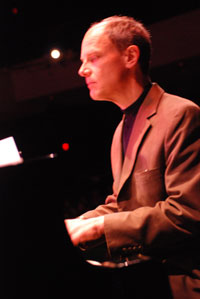
Phil Farnsworth
Joseph Mulholland
For media inquiries, please contact Media Relations
Joseph Mulholland is an associate professor in the Harmony Department at Berklee College of Music. Before coming to Berklee, he taught piano and ensemble at Brown University and Boston-area music schools, as well as serving as music director for Didi Stewart and Friends, an award-winning ensemble devoted to presenting full-length tributes to composers and performers in the Great American Songbook and classic R&B styles.
An accomplished pianist, recording artist, composer, and teacher, he has released three CDs of original music written for his sextet, and has composed numerous electronic scores for Boston-area dance companies, including a tango suite commissioned by the Northeast Youth Ballet that was performed in Massachusetts and New Jersey. Mulholland performs with his trio 100 nights per year at the Top of the Hub, an upscale jazz venue in Boston, in addition to appearing as a sideman and vocal accompanist in numerous other concert and club settings. As music director for the Windhover Center for the Performing Arts, he has composed and recorded sound design and songs for original productions of Peer Gynt and Dogtown Common. He also wrote 11 songs and three dance numbers for the original musical, Battle for Pigeon Cove Harbor.
Piano is his first love and main instrument, but Mulholland is equally comfortable on synthesizer and has an abiding love of Hammond B-3 organ. For enjoyment and variety, he plays guitar and percussion. He has recently divided his spare time between transcribing and playing Brazilian music and studying with the legendary jazz teacher Charlie Banacos.
- Freelance jazz pianist and vocal accompanist
- Composer and arranger for dance, theater, film, and video
- Released three CDs with the Joe Mulholland Sextet, including Eye Music, 2001
- Member of Martin St. Collage, an improvisational music/painting/dance ensemble, 1990–1998
- Member of the Big & Phat Jazz Big Band and the Indigo Invention Group
- Music director, Windhover Center for the Performing Arts; composed and recorded sound design and songs for original productions of Peer Gynt, Dogtown Common, and Battle for Pigeon Cove Harbor
- Performances at the Regattabar, Top of the Hub, Scullers, and the Waterfront Jazz Festival, among others
- Music director for Didi Stewart and Friends, 1987–1998
- Taught jazz piano and ensembles at Brown University, 1985–1997
- Composed and performed a tango suite for the Northeast Youth Ballet
- Created electronic scores for "Intersections" and "My Backyard," modern dance pieces premiered in 2004 and 2005
- Berklee faculty member since 1994
-
School NameNew England ConservatoryDegreeMaster of Arts (M.A.)Field of StudyMusicDate Degree Received
-
School NameWilliams CollegeState or ProvinceMassachusettsDegreeBachelor of Arts (B.A.)Field of StudyPsychologyDate Degree Received
